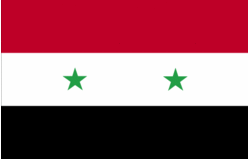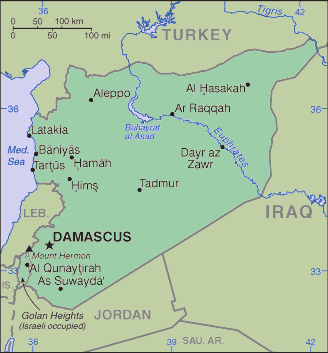Traveling Luck for Syria. Syria, Asia
Syria is located in Middle East, bordering the Mediterranean Sea, between Lebanon and Turkey.
Land in Syria is primarily semiarid and desert plateau; narrow coastal plain; mountains in west.
Syrian land covers an area of 185180 square kilometers which is slightly larger than North Dakota
Syria has borders with Israel for 76km, Iraq for 605km, Jordan for 375km, Lebanon for 375km and Turkey for 822km.
 Syrian national flag (Flag of Syria)
Syrian national flag (Flag of Syria)
As for the Syrian climate; mostly desert; hot, dry, sunny summers (June to August) and mild, rainy winters (December to February) along coast; cold weather with snow or sleet periodically in Damascus.
Syrian(s) speak Arabic (official); Kurdish, Armenian, Aramaic, Circassian widely understood; French, English somewhat understood.
Places of note in Syria
- Aleppo
- Damascus
- Ḩimş
- Ḩamāh
- Latakia
- Dayr az Zawr
- Ar Raqqah
- Al Bāb
- Idlib
- Dūmā
- As Safīrah
- Salamīyah
- Ţarţūs
- Ath Thawrah
- Al Ḩasakah
- Dārayyā
- Manbij
- Jablah
- As Suwaydā'
- Abū Kamāl
- At Tall
- Al Mayādīn
- Ar Rastan
- Tadmur
- An Nabk
- Khān Shaykhūn
- `Afrīn
- `Irbīn
- Al Quşayr
- Yabrūd
- Jisr ash Shughūr
- Bāniyās
- Talbīsah
- Ḩarastā al Başal
- Al Qunayţirah
 Syrian map
Syrian map
Regions of Syria
Following the breakup of the Ottoman Empire during World War I, France administered Syria until its independence in 1946. The country lacked political stability, however, and experienced a series of military coups during its first decades. Syria united with Egypt in February 1958 to form the United Arab Republic, but in September 1961 the two entities separated and the Syrian Arab Republic was reestablished. In November 1970, Hafiz al-ASAD, a member of the Socialist Ba'th Party and the minority Alawite sect, seized power in a bloodless coup and brought political stability to the country. In the 1967 Arab-Israeli War, Syria lost the Golan Heights to Israel, and over the past decade Syria and Israel have held occasional peace talks over its return. Following the death of President al-ASAD in July 2000, his son, Bashar al-ASAD, was approved as president by popular referendum. Syrian troops - stationed in Lebanon since 1976 in an ostensible peacekeeping role - were withdrawn in April of 2005.
The Syrian Government estimates the economy grew by 4.5 percent in real terms in 2005, led by the petroleum and agricultural sectors, which together account for about half of GDP. Economic performance and the exchange rate on the informal market were hit by international political developments following the assassination in February of former Lebanese Prime Minister Rafiq al-HARIRI and the specter of international sanctions. Higher crude oil prices countered declining oil production and exports and helped to narrow the budget deficit and widen the current account surplus. The Government of Syria has implemented modest economic reforms in the last few years, including cutting interest rates, opening private banks, consolidating some of the multiple exchange rates, and raising prices on some subsidized foodstuffs. Nevertheless, the economy remains highly controlled by the government. Long-run economic constraints include declining oil production and exports, increasing pressure on water supplies caused by rapid population growth, industrial expansion, and water pollution.
Syrian natural resources include petroleum, phosphates, chrome and manganese ores, asphalt, iron ore, rock salt, marble, gypsum, hydropower
there are 42 Israeli settlements and civilian land use sites in the Israeli-occupied Golan Heights (August 2005 est.)
Syrian religion is Sunni Muslim 74%, Alawite, Druze, and other Muslim sects 16%, Christian (various sects) 10%, Jewish (tiny communities in Damascus, Al Qamishli, and Aleppo).
Natural hazards in Syria include dust storms, sandstorms.
Travel Advice for Syria
SyriaSUMMARY
- Developments in the region may trigger public unrest. You should take care to avoid demonstrations, which can turn hostile, and be particularly vigilant in public places.
- There is a continuing threat from terrorism in Syria. The Syrian authorities have confirmed that on 28 November 2006, following a terrorist incident, two Syrian military personnel were injured near the Jedaida–Yabous crossing point with Lebanon. We understand the border is still operating as normal. On 12 September 2006, suspected terrorists launched an attack on the US Embassy in Damascus involving grenades and small arms fire. No US personnel were injured in the attacks but one bystander was killed and several injured.
- You should not attempt to enter Iraq via the Syrian border, which is subject to restrictions on both sides.
- The main type of incident for which British nationals require consular assistance Syria is replacing lost passports.
- We strongly recommend that you obtain comprehensive travel and medical insurance before travelling to Syria. You should check any exclusions, and that your policy covers you for the activities you want to undertake. Please see: Travel Insurance.
SAFETY AND SECURITY
LOCAL LAWS AND CUSTOMS
The punishment for possession of drugs is life imprisonment. For drug trafficking, the death penalty applies. It is illegal to change money on the street. Change money only in recognised exchange shops, banks and hotels. Credit cards are not widely used. Exercise discretion in behaviour and dress, especially when visiting religious sites. Homosexuality is illegal.
Photography near military and many other government installations is prohibited. These zones are not always marked; you should exercise common sense and limit photography to traditional tourist sites.
ENTRY REQUIREMENTS
HEALTH
GENERAL
OTHER

 Search
Search Syria country profile
Syria country profile Travel advice for Syria
Travel advice for Syria